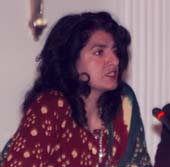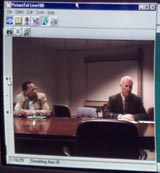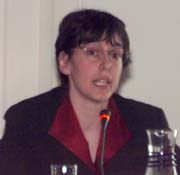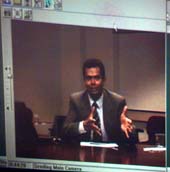|
|
|
|
|
The FCCC Technical Workshop on Mechanisms began on 9 April 1999 at La Redoute in Bonn-Bad Godesberg, Germany. The workshop is designed to advance the discussion on technological and methodological aspects of issues referred to in paragraph 1 of Decision 7/CP.4 (Work programme on mechanisms of the Kyoto Protocol). Under this decision, the Conference of the Parties, decided on a work programme on mechanisms, including the list of elements in an annex to the decision. The programme will "be undertaken with priority given to the clean development mechanism, and with a view to taking decisions on all the mechanisms under Articles 6, 12 and 17 of the Kyoto Protocol at its sixth session, including, where appropriate, recommendations to the Conference of the Parties serving as the meeting of the Parties to the Kyoto Protocol at its first session" on:
- Guidelines concerning provisions under Article 6 (joint implementation) of the Kyoto Protocol;
- Modalities and procedures for a clean development mechanism as defined in Article 12 of the Kyoto Protocol, with the objective of ensuring transparency, efficiency and accountability through independent auditing and verification of project activities, and including implications of Article 12.10 of the Kyoto Protocol;
- Relevant principles, modalities, rules and guidelines, in particular for verification, reporting and accountability of emissions trading, pursuant to Article 17 of the Kyoto Protocol;
Core topics at the workshop will include reference case/baseline methodologies, additionality, verification and reporting in relation to the clean development mechanism (CDM) and Article 6 projects. Further issues to be addressed will be the validation and funding of projects under the CDM and the adaptation component.
FRIDAY UPDATE
The meeting began with opening remarks from the Chair of SBSTA and the FCCC Executive Secretary
Chow Kok Kee, SBSTA Chair,
highlighted two related milestones recently achieved by Parties: the setting
of timeframes for agreeing on a framework for rules related to Protocol
Articles 6 (joint implementation), 12 (clean development mechanism) and
17 (emissions trading); and the underscoring of the need for capacity
building that will help advance the implementation of technology transfer,
AIJ and other issues. He stressed the urgency for building capacity and
noted that this workshop was the first instance where Parties, IGOs and
NGOs can gauge their work on mechanism since COP-4. He said the workshop
would be very technical, with expert presentations and time for questions,
answers and exchange of views. ![]() RealAudio excerpts from the Chairman's speech
RealAudio excerpts from the Chairman's speech
FCCC Executive Secretary Michael
Zammit Cutajar, said the key word for the workshop is "technical"
and the meeting would test the capacity of the Parties to engage in technical
work while keeping political issues "on the backburner." This
need is growing throughout the FCCC process and the full Convention bodies
may be too unwieldy for such work. He noted that "technical"
does not necessarily mean complex and stressed that mechanisms must work
in the real world, not just on the drawing board of climate change specialists.
He cautioned that striving too hard for perfection ran the risk of diminishing
the process and called for credible but simple solutions. ![]() RealAudio of Mr. Zammit Cutajar's speech
RealAudio of Mr. Zammit Cutajar's speech
The discussion sessions began with expert presentations followed by a period for questions and answers.
ARTICLE 12: CLEAN DEVELOPMENT MECHANISM
Overview
- Eric Haites, Margaree Consultants,
Inc., discussed the operation and governance of the Clean Development
Mechanism
 RealAudio of Mr. Haites's overview (added 14/4/99)
RealAudio of Mr. Haites's overview (added 14/4/99)
Reference case/baseline methodologies (Article 12.5 (b) and (c)) and Additionality (Article 12.5 (c))
- Alex Michaelowa, presented "Project
specific benchmark, top-down approach for baselines and additionality:
a comparison."
 RealAudio of Mr. Michaelowa's presentation
RealAudio of Mr. Michaelowa's presentation - Robert O. Williams, UNIDO, examined
baselines for projects in the industrial sector.
 RealAudio of Mr. William's presentation
RealAudio of Mr. William's presentation - Liu, Deshun, Tsinghua University discussed developing country perspectives on baseline and additionality approaches"
Assistance in meeting the costs of adaptation
- Farhana Yamin, Foundation for International
Environmental Law and Development (FIELD), presented options and issues
for activities related to the adaptation component under the CDM
 RealAudio of Ms. Yamin's presentation
RealAudio of Ms. Yamin's presentation - Ravi Sharma, UNEP, discussed the sharing of proceeds for Adaptation.
Assistance in arranging funding (12.6)
- Annie Roncerel, UNDP, considered the CDM as an innovative financing tool for energy development.
- Dieter Strack discussed financial engineering for renewable energy projects.
- Youba Sokona, ENDA, examined development financing options for developing countries and highlighted: official development assistance (ODA); multilateral and bilateral loans with specific conditionalities; and foreign direct investment (FDI).
- Ken Newcombe, World Bank, reviewed the AIJ/JI experience as it relates to funding and noted that there have seen significant barriers to AIJ investment in Africa.
Validation, Verification and Certification (12.5, 12.6, 12.7, 12.9)
- Johannes Heister, World Bank and Einar Telnes, Det Norske Veritas (DNV) presented "Experiences with verification/certification of the ILUMEX (AIJ) project results"
ARTICLE 6 PROJECTS: JOINT IMPLEMENTATION
Overview
- Lubomir Nondek presented an overview of the issues.
Reference case/baseline methodologies and additionality (6.1 (b)) and Verification and Reporting – technical and process issues (6.2)
- Edward Helme, CCAP, presented "Issues related baseline methodology options and additionality under Article 6"
- Jane Ellis, OECD, discussed lessons learned from the AIJ pilot phase in projects involving EIT countries.
- Matthew Mendis, AED, outlined experiences from designing mitigation options and projects.
THINGS TO LOOK FOR
On Saturday, 9 April, participants will continue their discussions on Article 6 projects and begin discussions on Article 17 (emissions trading).
|
|
|
Mohammad Salamat, Vice-Chair of SBI (left) and Chow Kok Kee, Chair of SBSTA (right). |
 |
|
Eric Haites, Margaree Consultants Inc.
|
|
|
Robert O. Williams, UNIDO |
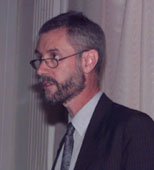 |
|
Farhana Yamin, FIELD |
|
|
Dieter
Strack
|
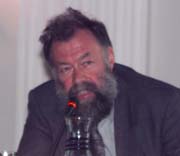 |
|
Dieter
Strack
|
 |
| Youba Sokona, ENDA, and Ken Newcombe, World Bank, via satellite link-up. | |
|
Einer
Telnes, Det Norske Veritas (DNV)
|
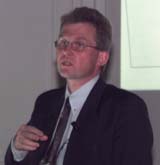 |
| Jane Ellis, OECD | |
|
Lubomer
Nondek
|
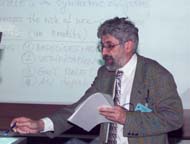 |
| Matthew Mendis, AED (via video link) |
© Earth Negotiations Bulletin, 1999. All rights reserved.


